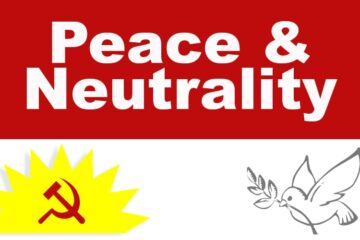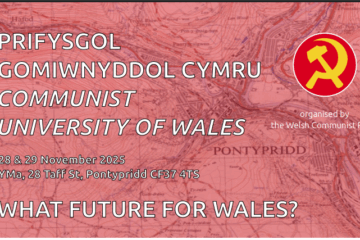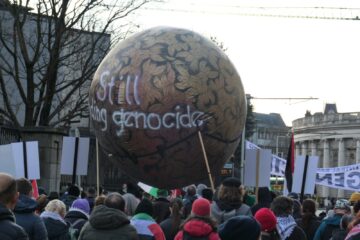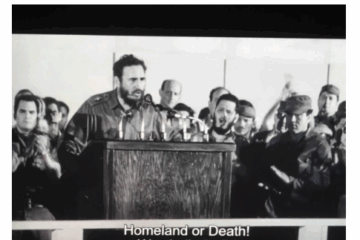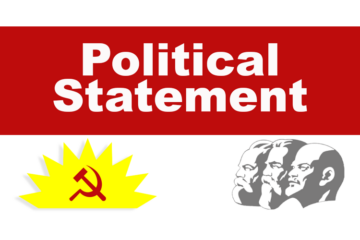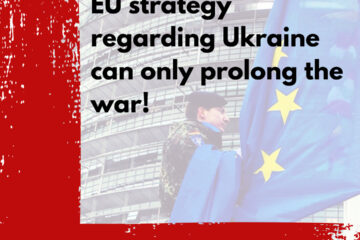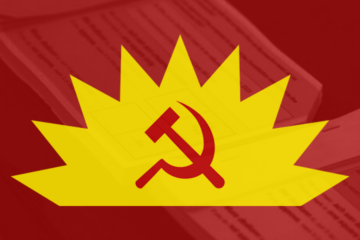22 March 2010
The National Executive Committee of the Communist Party of Ireland at its regular meeting welcomed the devolution of policing and justice powers to the Northern Ireland Executive. The CPI acknowledges that this is an important step forward while rejecting the lack of transparency and political exclusion in reaching this agreement. It calls on all democratic forces to unite and to work for a strong Bill of Rights, one that is comprehensive in covering such areas as the right to work, to housing, to food, to education, to health, to full equality between women and men, and respect for language and cultural diversity. It must also recognise the right of women to have control over all aspects of reproduction, including abortion. It must have real teeth so as to outlaw all forms of discrimination based on gender, race, sexual orientation, or religion.
The party also restates its demand for the full transfer of fiscal powers to the Assembly and Executive. This is essential for developing the necessary economic and social policies that would begin to build an all-Ireland economic recovery strategy that is both sustainable and environmentally responsible. Such a strategy would allow for the maximum concentration of capital resources and investment priorities, which would begin the difficult but necessary process of overcoming the legacy of two failed political and economic entities.
The CPI acknowledges that while the country is experiencing a severe economic crisis, one resulting from the systemic cyclical nature of the capitalist system itself, the economic crisis has not yet translated into a political crisis for the system. The development of a strategy for building the necessary forces to mount a challenge to this system is the task before the 24th National Congress of our party later this year. Irish communists reiterate their long-held view that it is not the job of workers’ organisations to find solutions to the problems of the dominant economic and political forces in our country.
The CPI calls for the building of a fight back by workers throughout the country, which is necessary to counter the co-ordinated and intensifying attacks on workers’ rights, terms and conditions demanded and pursued by both the Irish and British governments and the European Union. The EU Commission is exploiting the crisis to further expand its domination and control over the economic policies of the member-states. This is reflected in its demanding more and deeper cuts and tighter controls on public spending, which will have most effect on workers, the unemployed, and poor families. This must be resisted by all means at our disposal.
Despite the many-sided attacks on working people by government and employers, workers have shown some signs of resistance and courage in the face of the barrage of hostile attacks from the establishment media. We again express our solidarity with those involved in struggle to defend themselves and point to the example of the Green Isle workers, the Aer Lingus cabin crew workers and public-service workers for their courage in standing up and defending themselves. These are small but hopeful signs of the potential for building resistance.
We Irish communists also express our full solidarity with the workers in British Airways as they engage in industrial action to defend themselves and their livelihoods.
The CPI calls on the trade union movement to develop its own alternative economic and social programme, one that reflects the needs of working people throughout the whole of Ireland. The trade union movement needs to grasp this central fact in order to develop a campaign for a different Ireland. It needs to begin a counter-offensive and to explain to workers that the Government and employers’ strategy is to ensure that the small elite clique—the Golden Circle—will remain in control, that the threatened cuts are intended to maintain the status quo, and that an unequal and unjust Ireland will not work.
The militant struggle of the Greek workers has shown that when workers have a clear alternative and consistent and militant leadership they will engage in the necessary actions.
No amount of appeals to the correctness or justice of one’s position or demands, or better “public relations,” will advance the interests of working people. The trade union movement’s alternative must be backed up, using its organised power to put workers’ issues to the top of the political agenda. Workers’ organisations need to have their own world view, their own economic and social priorities for a different Ireland. They need to be as clear in their alternative strategy and in fighting for it as the Government and the bosses are in pursuing their selfish interests.
The CPI acknowledges the recent statement by twenty-four economists and researchers that criticises the present economic and social strategy of the Government and that calls for a change of direction as an important contribution to building confidence among people about the possibility of an alternative direction for our country. Some of the ideas expressed are in line with our own publication An Economy for the Common Good, whose central thrust is a radical transformative strategy for the whole of the country. We again assert that the establishment of a state bank and a state development corporation, under democratic control, are the necessary building-blocks for beginning to overcome the consequences of the present crisis of the capitalist system.
No solution is to be found in retreating back into talks about the dead-end process of “social partnership.” That strategy has left the trade unions powerless and mere managers of Government policies.
Workers will win or advance little if disunited and prepared to see each other’s terms and conditions eroded. It is only the employers and their Government that can benefit. What is needed now is to rebuild the unity of all workers, to rebuild unity between public and private-sector workers.
The CPI once again calls on all left and progressive forces to unite to build the people’s fight back. Communists will play their part in helping to build the necessary forces for organising and mounting that resistance.
The continuing revelations about child abuse by a large number of Catholic clergy is an appalling indictment of the hierarchy of the Catholic Church. The CPI expresses its profound sympathy and solidarity with the many victims. It is clear that the Catholic Church as an institution has attempted over many decades, as a deliberate policy, to cover up this widespread abuse. This policy of covering up such crimes and bullying the victims was not the policy of the Irish Catholic hierarchy alone but was one instituted and enforced from the Vatican itself. We support the call by the many victims for the prosecution of all those responsible both for the abuse and for the cover-up.
The institutional Catholic Church was for many decades one of the central pillars of the political establishment in the South. It used its power to browbeat and bully the people, not only its own church members but anyone who challenged its authority or that of the political establishment. The institutional church was a central element of the political and ideological control over the people, using its tight control over education and its content as the means of achieving this. In addition, the establishment allowed the church to control whole swathes of social and cultural life and many social services.
The institutional church as a vehicle for the ideological conditioning of the people is now severely damaged. Pressure must now be built for the removal of the church from any control or say in education and for the establishment of a locally controlled and democratically accountable education system. We reiterate our call for the complete separation of church and state.



